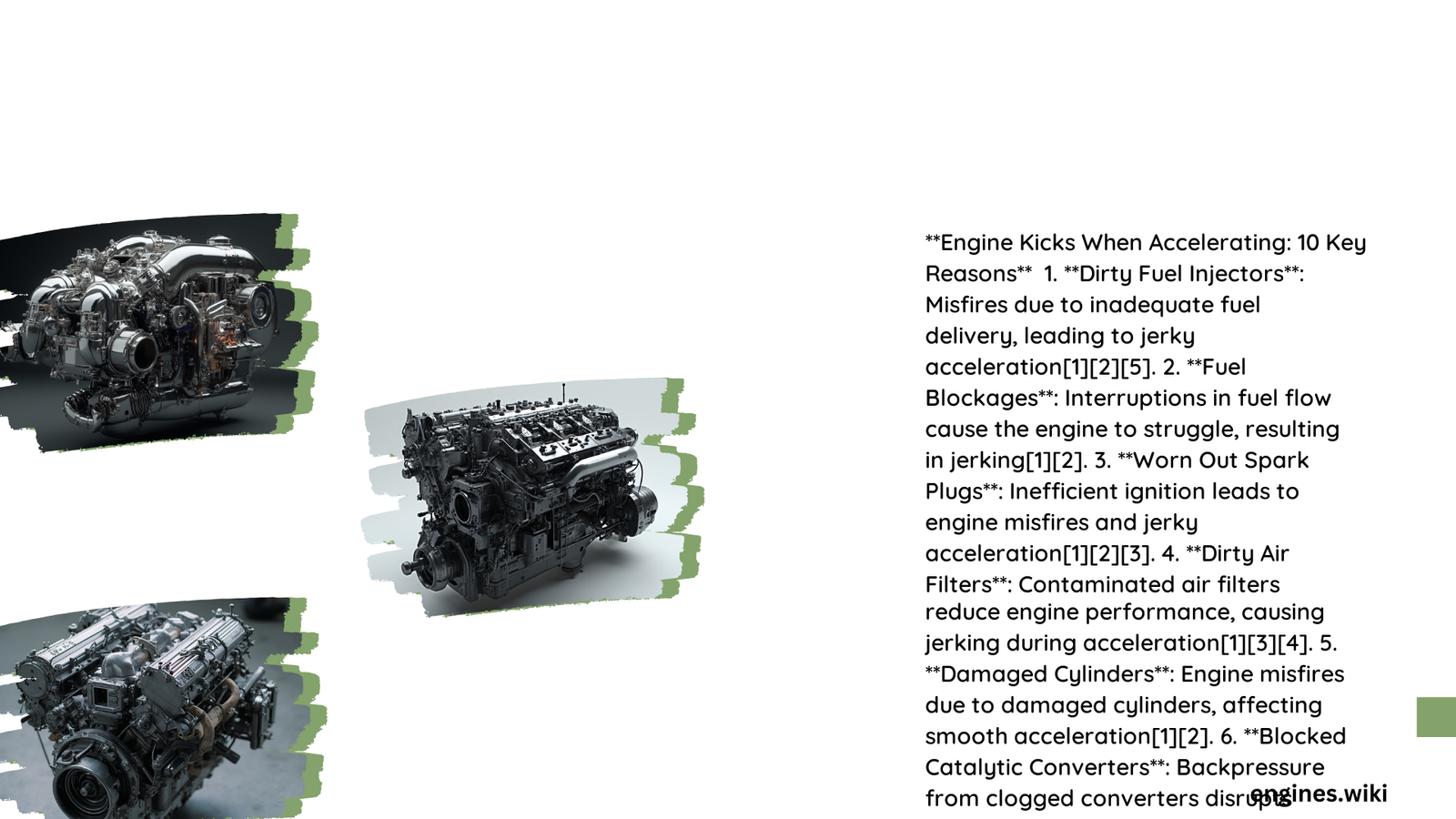Engine kicks when accelerating can be a frustrating and potentially dangerous issue for drivers. This problem is often characterized by sudden jerks or hesitations in the engine’s power delivery during acceleration. It can be caused by various factors, including ignition timing issues, fuel delivery problems, and vacuum leaks. Understanding the causes, symptoms, and solutions for engine kicks during acceleration is crucial for maintaining your vehicle’s performance and safety.
What Are the Common Causes of Engine Kicks When Accelerating?
Engine kicks during acceleration can stem from several mechanical issues:
- Ignition Timing Problems
- Advanced or retarded ignition timing
-
Faulty vacuum advance systems
-
Fuel Delivery Issues
- Lean air/fuel mixture
- Rich air/fuel mixture
-
Clogged fuel injectors or filters
-
Vacuum Leaks
- Intake manifold leaks
- Damaged vacuum hoses
Let’s delve deeper into each of these causes:
Ignition Timing Issues
Proper ignition timing is crucial for smooth engine operation. When the timing is off, it can lead to:
- Advanced Timing: Causes detonation or pinging, resulting in engine kicks
- Retarded Timing: Leads to a lean air/fuel mixture, causing surging or kicking
Vacuum advance systems, if malfunctioning, can also contribute to improper timing adjustments, especially at part throttle.
Fuel Delivery Problems
The air/fuel mixture plays a significant role in engine performance:
- Lean Mixture: Often caused by faulty fuel injectors, clogged filters, or a malfunctioning mass airflow sensor
- Rich Mixture: Less common but can lead to engine kicking if it causes the engine to run hot
Vacuum Leaks
Vacuum leaks can cause erratic engine behavior:
- Intake Manifold Leaks: Result in inconsistent vacuum readings
- Damaged Vacuum Hoses: Lead to fluctuating vacuum levels during acceleration
What Are the Symptoms Associated with Engine Kicks During Acceleration?

Identifying the symptoms can help diagnose the issue:
- RPM Fluctuations
- Erratic idle
-
RPM drops during acceleration
-
Power Loss
- Reduced acceleration
-
Engine stalling in severe cases
-
Diagnostic Trouble Codes (DTCs)
- P0300-P0308: Indicate cylinder misfires
- P0171-P0174: Suggest lean or rich air/fuel mixtures
How Can You Troubleshoot Engine Kicks When Accelerating?
Effective troubleshooting involves several techniques:
- Vacuum Gauge Testing
- Check for steady, high vacuum readings at idle
-
Look for fluctuations during deceleration
-
Compression Testing
- Identify cylinders with low compression
-
Can indicate issues like worn piston rings or burned valves
-
Spark Test
- Check spark plugs and ignition coils for proper output
-
Replace faulty components as necessary
-
Fuel System Check
- Inspect fuel injectors, filters, and mass airflow sensor
- Look for malfunctions or blockages
What Are the Repair Costs Associated with Engine Kicks?
Repair costs can vary depending on the specific issue:
| Component | Average Cost | Labor Time |
|---|---|---|
| Ignition Coils | $50-$200 each | 1-2 hours |
| Spark Plugs | $5-$20 each | 1-2 hours |
| Fuel Injectors | $50-$200 each | 2-4 hours |
Additional costs may include specialized tools:
– Vacuum gauge: $20-$100
– Compression test kit: $50-$200
– Spark tester: $10-$50
How Do Engine Kicks Affect Vehicle Performance?
Engine kicks can significantly impact your vehicle’s performance:
Fuel Efficiency
- Lean air/fuel mixture: Up to 20% reduction
- Rich air/fuel mixture: 5-10% reduction
Acceleration
- 0-60 mph times can increase by 1-3 seconds
Long-Term Engine Damage
- Detonation/pinging can lead to piston failure and cylinder head damage
- Vacuum leaks may cause premature wear on engine components
What Are the Best Practices to Prevent Engine Kicks When Accelerating?
To minimize the risk of engine kicks:
- Regular Maintenance
- Follow manufacturer-recommended service intervals
-
Replace wear items like spark plugs and fuel filters on schedule
-
Prompt Attention to Warning Signs
- Address check engine lights promptly
-
Investigate any changes in engine performance or fuel efficiency
-
Quality Fuel and Parts
- Use recommended fuel grade
-
Choose high-quality replacement parts
-
Professional Diagnostics
- Utilize professional diagnostic tools for accurate problem identification
- Seek expert advice for complex issues
By understanding the causes, symptoms, and solutions for engine kicks when accelerating, you can maintain your vehicle’s performance and avoid potentially costly repairs. Regular maintenance and prompt attention to warning signs are key to preventing these issues and ensuring a smooth, efficient driving experience.
References:
1. Automotive Tech Info
2. Come and Drive It
3. MOTOR Magazine
